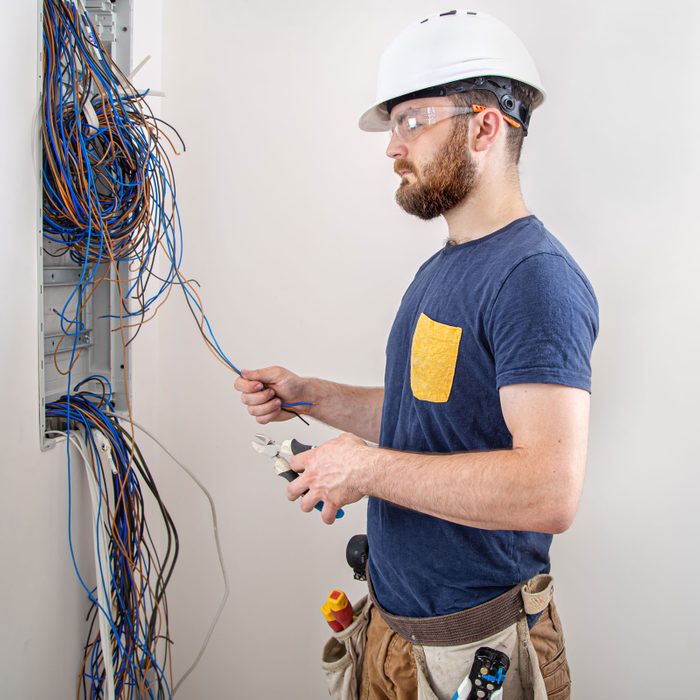How Much Does It Cost To Hire an Electrician vs. DIY?

You need some electrical work done, but you can't decide whether to DIY or hire an electrician. Here are a few tips that may help you decide.
There’s an old expression attributed to Benjamin Franklin: “Time is money.” That phrase carries a lot of weight when trying to decide if you should hire a contractor for electrical work or perform it yourself.
Electrical contractors know how precious time is. They have a business to run and workers who need to be paid. They must generate revenue to cover expenses and make a profit.
As a homeowner, your time is also a commodity. If you have plenty of spare time and the knowledge and skills to tackle certain projects, you can save a lot of money compared to hiring an electrical contractor. On the other hand, if you’re busy with work and family, isn’t it worth your time to hire a professional to do the work quickly and safely? Maybe even before you get home from work?
Here we’ll get into the costs of several home electrical projects, and whether you should have them done by a pro or go the DIY route.
On This Page
How Do Electrical Contractors Charge for Their Services?
Time and material projects
For small projects, many contractors keep things simple and charge their customers for time and materials. Every contractor will set a “small project” cost threshold that fits their individual business plan. Small projects generally cost less than $500.
The time and material method is also used when it’s impracticable to estimate the cost of a project ahead of time.
Bid projects
For larger projects, it’s more common for the contractor to submit a bid to the homeowner. To ensure competitive pricing, consumer protection advocates always recommend getting bids from more than one contractor. The bidding process takes more time, but it’s an effective method for selecting a contractor at the best possible price.
The bid documents should contain all the specifications for the project and the services included in the cost. To avoid any confusion, be sure the bid documents clearly detail all the work.
Service calls
Hourly rates vary in different regions, but you should expect to pay about $125 an hour for a licensed journeyworker electrician. If the project needs additional help, the contractor may also send an unlicensed apprentice electrician to the job site at a lower hourly rate of around $95.
In many regions, one licensed journeyworker electrician is authorized to personally supervise up to two unlicensed apprentice electricians at the job site. This helps reduce the labor costs for the customer, and gives the apprentices valuable experience they need to eventually obtain their journeyworker licenses.
Material markup and overhead
Contractors will often mark up the cost of materials as part of their business model. Like all costs, markup will vary by region, but contractors may charge 10% for overhead and as much as 40% for markup.
Markups of 20%, 30% or 40% might seem excessive, but it’s important to remember the contractor may warranty their workmanship for up to five years and materials for one year. The warranty is a written guarantee the contractor will come back and take care of specific issues at no additional cost.
Before selecting a contractor, be sure to inquire about their warranties. A low bid may seem attractive at first, but you might regret that decision if there is no warranty coverage.
Most Common Electrical Projects and How Much They Cost
The estimated costs listed below will vary by region and don’t include local fees for permits and inspections. The time it takes to complete a project will also vary depending on job site conditions. Mike Phiffner from South Side Electric in Bloomington, Minn. graciously shared a list of his most frequent homeowner projects.
Troubleshooting existing branch circuits (dead wiring, short circuits, overloaded circuits, etc.)
- Cost: $250.
- These types of problems can usually be resolved in a couple of hours.
Replace old light fixtures with new light fixtures
- Cost: Minimum service call of $125.
- The number of fixtures will be a factor in the total cost.
Install receptacle outlets, ground-fault protection (GFCI), arc-fault protection (AFCI), etc.
- Cost: $350 or more.
- This is more complicated than replacing a light fixture, so more time is required.
Install wiring for major appliances like a range, clothes dryer or wall oven
- Cost: $750 or more.
- Dedicated 30-, 40- or 50-ampere branch circuits involve more costly materials and time.
Install wiring for a bathroom remodel project
- Cost: $1,200 or more.
- Many things contribute to the cost, including new lighting, a new exhaust fan, GFCI-protected receptacles and that in-floor electric heat you’ve always wanted.
Install wiring for a kitchen makeover project
- Cost: $10,000 or more.
- One of the most expensive upgrades in any home.
Convert an unfinished basement into a habitable space
- Cost: $5,000 or more.
- These projects will vary depending on existing conditions, like the age of the home.
Replace the outdated service panel with a new one
- Cost: $1,500 or more.
- This takes less time if the new panel fits within the footprint of the old panel.
Upgrade the old 60- or 100-ampere service to 200- or 400-ampere service
- Cost: $2,750 or more.
- Bigger equipment and more time drive up the cost of this type of project.
Install wiring for an electric vehicle (EV) charging station
- Cost: $1,000 or more.
- Installation depends on whether the existing service panel has adequate capacity to supply the EV equipment.
Troubleshoot homeowner wiring projects deemed to be non-compliant by the electrical inspector
- Cost: Minimum service call of $125.
- These situations vary greatly, but sometimes you’ll need help from a contractor to pass the final electrical inspection.
What Are Some Advantages of Hiring an Electrical Contractor?
- Quality workmanship by licensed professionals;
- Licensed, bonded and insured through state or local regulatory authorities;
- Statutory warranties are common, and often require contractors to guarantee their work;
- Familiarity with the process for permits and inspections;
- Familiarity with written estimates, quotes and contracts;
- Up-to-date on the most recent electrical code changes;
- Close coordination with electric utilities for service panel upgrades;
- Possess the skills, knowledge, tools, equipment and materials to do the job in the most timely manner.
- There’s value in a good working relationship with an electrical contractor who you can call on when necessary, no different than having other skilled professionals on speed dial.



